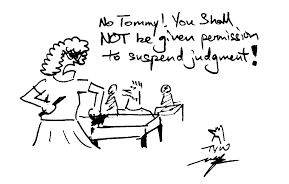On Being Quick to Learn and Slow to Judge
Posted By Cliff Tuttle | June 23, 2018
No. 1,509
It is worth a reminder not to draw conclusions with less than full information.
Information is being communicated to us with incredible speed. Yet, too often, what reaches our eyes and ears first is incomplete or worse, presented to further the interests or biases of the communicator. If the communicator is also a persuader, the information presented must be sifted with special care.
To see an illustration of this phenomenon, switch the TV channel back and forth between the major news networks during a breaking news event. The differences in presentation can be astounding.
It is critical to suspend judgment until all of the relevant facts are in. That can be difficult to do. But reserving judgment is a state of mind that can be cultivated. So is skepticism. There is nothing wrong with examining everything that comes to you with a critical eye, no matter what the source. Moreover, truth has layers. Specific facts presented may be flawed or even misrepresented. But additional information, garnered over time, may nevertheless justify the same conclusion, despite the initial flawed communication. One statement that seems improbable can turn out to be the truth. Another that seems credible can be an outright lie.
That doesn’t mean that it is ethical to attempt to deceive. Don’t do it. After you are found out, your credibility is damaged, perhaps destroyed. Like the little boy who cried wolf, you may not be believed, even when correct.
Lawyers face these problems all of the time. In a criminal case, for example, the prosecution presents its case first. I’ve asked the jury to withhold judgment until after they have heard the defense. Jurors want to be fair and a reminder that a trial is organized to permit the orderly presentation of evidence is very helpful. Moreover, the weakness in a key witnesses’ testimony may only appear later, after cross examination or testimony of other witnesses.
We should all develop the healthy habit of withholding judgment until we have heard the whole story. That applies to everything, not just the news or court cases. Healthy skepticism is a habit worth cultivating.
CLT
Tags: healthy skepticism > suspending judgment




